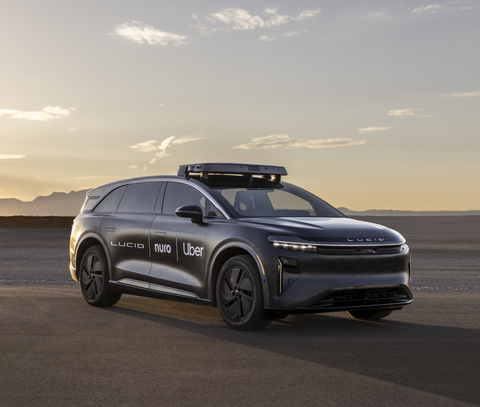Uber has announced two major partnerships to accelerate its autonomous vehicle deployment strategy—one with China’s Baidu for international robotaxi expansion, and another with Lucid Motors and Nuro for a premium, U.S.-based autonomous fleet. Together, these agreements reflect Uber’s shift toward a partner-integrated approach to autonomy, positioning the company as a global orchestrator of driverless mobility platforms.

Uber and Baidu: Scaling Autonomy Internationally
In a multi-year agreement announced July 15, Uber and Baidu will integrate Baidu’s Apollo Go autonomous vehicles into Uber’s ride-hailing platform in international markets outside China and the United States. The partnership will begin deploying vehicles later this year across select cities in Asia and the Middle East.
Apollo Go, Baidu’s robotaxi service, has already completed over 11 million fully driverless rides and operates in more than 15 cities globally, including Dubai and Abu Dhabi.
“This partnership with Uber marks a significant milestone in Baidu’s global strategy,” said Weiquan Li, Senior Corporate Vice President of Baidu. “By combining our industry-leading autonomous driving technology with Uber’s world-class mobility platform, we will provide a reliable, safe and comfortable travel experience to users around the world.”
For Uber, the integration of Apollo Go vehicles enhances its international capabilities in cities that are receptive to AV deployments, bypassing domestic regulatory hurdles in the U.S. and China.
“This agreement reflects our platform strategy: bring the best mobility technologies to our global user base,” said Pierre-Dimitri Gore-Coty, SVP of Mobility at Uber. “With Baidu’s proven AV leadership and strong track record, we can expand safe, autonomous rides to more people faster.”
Lucid, Nuro, and Uber: Premium U.S. Robotaxi Fleet
In a separate announcement on July 16, Uber revealed it will partner with electric vehicle manufacturer Lucid Motors and autonomous technology firm Nuro to deploy a fleet of over 20,000 autonomous robotaxis in the United States over the next six years.
The vehicles will be based on the Lucid Gravity SUV and equipped with Nuro’s production-grade Level 4 autonomy system. Deployment is expected to begin in 2026, with initial pilot testing already underway in Las Vegas.
“Lucid’s mission is to inspire the adoption of sustainable energy with advanced technology and beautiful design,” said Peter Rawlinson, CEO and CTO of Lucid Motors. “Partnering with Uber and Nuro allows us to bring our vision for innovation and electric mobility into a transformative new application.”
“This partnership represents a major step toward scaling safe, autonomous driving technology in the real world,” said Jiajun Zhu, Co-Founder and CEO of Nuro. “Together with Uber and Lucid, we’re building a future where getting a ride is safer, greener, and more accessible.”
Uber will invest hundreds of millions of dollars to support the effort, including $300 million for integration and vehicle optimization.
“This partnership accelerates our commitment to autonomy by combining best-in-class vehicle engineering, autonomous technology, and platform scale,” said Noah Zych, Head of Autonomous Mobility at Uber. “We’re excited to bring the next generation of autonomous rides to our users in the U.S.”
Strategic Realignment Toward Platform-Driven Autonomy
These dual partnerships represent a calculated pivot by Uber toward autonomy-as-a-service. Rather than owning the development of AV stacks, Uber is positioning itself as the global marketplace for autonomous rides—leveraging partners with domain expertise and focusing on scaling deployment through its platform infrastructure.
By collaborating with Baidu internationally and Lucid/Nuro domestically, Uber aims to deliver autonomy in a diversified, regulatory-aware manner. It also reaffirms Uber’s long-term vision for AVs as a key pillar of its mobility business, following its exit from in-house AV development through the 2020 sale of Uber ATG to Aurora.
Each partnership is purpose-built: Baidu’s Apollo Go enables near-term international deployment in receptive regulatory environments, while the Lucid/Nuro collaboration focuses on high-end U.S. robotaxi operations with purpose-built electric vehicles and production-grade autonomy.
Looking Ahead
With Apollo Go vehicles preparing to launch on the Uber platform overseas and Gravity SUVs entering pilot programs in the U.S., Uber is now executing on a strategy to become the integrator of global robotaxi operations. These announcements mark a notable acceleration in the company’s autonomy roadmap—one defined not by internal R&D, but by high-impact collaboration.
While real-world deployment will depend on regulatory approvals and technical validation, Uber’s latest moves show that its vision for autonomous ride-hailing is gaining operational momentum, underwritten by industry-leading partners with a shared interest in reshaping urban mobility.

